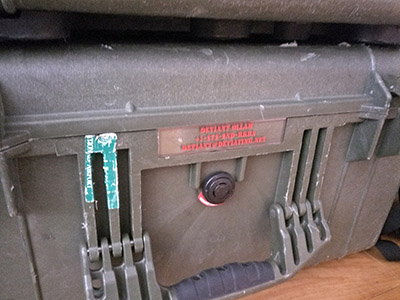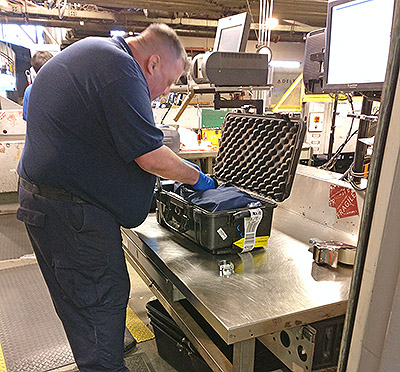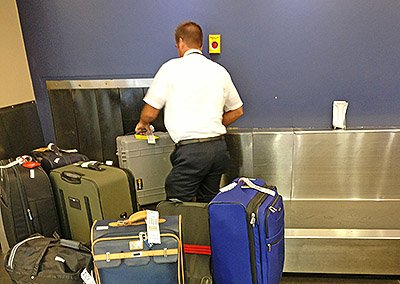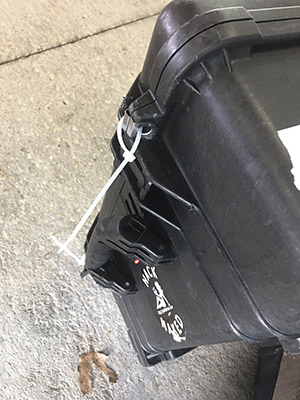What
to Do if Your Bags Were Opened or Locks Were Cut
Deviant
Ollam
Traveling with firearms should be a pleasant and simple experience, even via air. Hopefully the tips and information in this part of my web site will aid you upon your journey. This page is for those times when things don't go smoothly... when someone, somewhere does something very out of accordance with policy and your luggage is opened -- possibly even your locks are cut -- without your knowledge. This page is a page that I hope none of my friends and associates have to read.
- How to Best Avoid This Problem -
Most of the information I've presented elsewhere should give you the best shot at having a successful journey. However, if you are especially concerned about the possibility of difficulty, follow these steps as carefully as you can...
Step 0. Only lock your outer case (if you're doing this to secure all of your belongings)... having locks on the outer case and then having a small hard case inside that which is also locked will give the TSA free reign to cut off the outer locks and then re-secure your case in whatever awful manner they wish... so long as they leave your smaller, internal gun case locked. It can also result in the airline hassling you during check-in. Don't give them that opportunity. Locks go on the very outside only. Also, make certain that your name and a phone number are affixed to the outside of the case. Pelican cases have small panels specifically for this purpose.
Step 1. Be present when the luggage is screened. Even if someone doesn't tell you that you can be there, do try to find out where the luggage is screened by the TSA and observe this process. I've been allowed to stand next to or just around the corner of small doorways or screening curtains in order to observe my luggage on the TSA table. And, of course, I'm right there if they have to open it.
Step 2. If your firearm-bearing luggage is going "to the back room" then you've got a more complicated situation.
Step 3. This is so critical... if your luggage has gone on a belt to a screening area, do not leave the front check-in hall counters until you have confirmed that it has cleared TSA. This is not always easy. Here are the possible situations you may face (ranked in order of best to worst in terms of how annoying things are) and how to handle each one...
Scenario A - You are told "let me call the TSA so they're ready to see a firearm case and find out if it cleared." This is wonderful. Stand right by the counter, and nod and smile as the airline rep speaks to the TSA to confirm that your firearm cases have processed through.
Scenario B - You are told "Just hang out here for about 10 minutes and if we don't page you, then you're cleared." This is annoying. And it's hands-down the best recipe for having your stuff messed with. Politely wait the 10 minutes or whatever, as directed, then DO NOT GO TO YOUR GATE. Instead, go right back up to the counter (skip the line, just stand up there saying "that employee asked me to come back up regarding my firearm" to other passengers.) Say, "it's been 10 minutes, can we confirm now that the gun case has cleared?"
If they try to say something like "trust me, you must be fine now," simply respond, "No, I'm sorry... I can't do that. Policy is that we have to get a positive confirmation from the TSA that things cleared."
I enjoy social engineering with creative language like "it's Department Policy" or "we wouldn't want [air carrier] to be held liable if the TSA opens the firearm case." Heh, I am not claiming to be Law Enforcement. But if an airport staff member think I meant "police department" then that's on them. Also, tossing around language to the effect of "shifting liability off the airline" is always likely to get some good traction. In any event, stand there and just generally be their problem until they call someone at the TSA.
Scenario C - Very similar to the above, but you are told "just go ahead to your gate and we'll page you if there's a problem." Yeah, nope. Same response as above... remain in the check-in area until you have confirmation from someone that the luggage has cleared TSA. This may be confirmation from an airline employee. It may come from a TSA staff member who is paged, shows up, etc. Get that confirmation.
Scenario D - Worst case, the airline staff members insist that they have no way to contact the TSA in the back room and can't give you any confirmation. You should always try to escalate. Ask for a supervisor. Ask them to call their Airport Ops desk. (Operations is usually the head office of all that airline's goings-on at a particular airport and can typically reach out to the TSA desk, etc)... bear in mind that you will likely be asking them to do something unprecedented. But not illegal or impossible. Airport staff have to bend rules and get creative a LOT of the time to just get their jobs done. Do not be surprised to see airport staff use their personal mobile phones as often as their desk phones when it comes to reaching out to others for more information.
Lean on them politely and generally make yourself a low-key nuisance who won't "just go away" until someone somewhere reaches out to the right people. I'd say that three-quarters of the time this will work. And you've done a public service, because the next time that a passenger makes the same request, it won't be such an edge case to them.
Step 4. No matter what happens, in just about ALL situations it's very much in your best interest to get names from the people with whom you interact.
This sounds like a hassle, but honestly it's not all that bad. I simply compose a new email to myself whenever I approach a counter in an airport. As I am interacting with the staff, I just glance at their uniform name tag or their security ID and jot down whatever name I can read. Having this information after-the-fact (particularly if something goes wrong) can be a BIG help and I've always been glad that I do this.
- What to Do if Your Locks Were Cut -
This is the scenario that no one ever wants to experience... you arrive at your destination and the proper locks that you've applied to your luggage are missing.
Maybe there's a note inside of your luggage from the TSA. Maybe you'll even find your locks in there. Either way, this is of course an awful scenario and one that should never happen.
What should you do? Follow these steps...
Step 0 - Do not remove your luggage tag! When inspecting things (the next logical step, as you'll see, is to check your firearm to see that it's OK) or otherwise moving stuff around, do not remove the luggage tag. The bag tag being intact is often a crucial element of registering a damage complaint with the airline and seeking retribution. Keep it on your luggage.

Step 1 - Check your firearm. See if your gun(s) show any signs of tampering. Even during a legitimate TSA inspection, they should not touch the firearm itself. NOTE - given concerns in airports after the awful domestic terror event in Fort Lauderdale, do not make it obvious that you are handling a firearm in a public area. Be discreet. Peek down into your range bag or whatever, just to see that the gun is there. Don't pull it out and start manipulating the action, etc.

Step 2 - Proceed immediately to the Baggage Services Office of your airline. While your air carrier is likely not the party who actually cut your locks, often they are the most important folk when it comes to documenting the damage and helping you with restitution. They have policies and procedures in place to document damage to luggage. Even if they state that "they aren't responsible for locked luggage" or whatever, please insist that they take down a proper report. You'll get a claim number, etc. Explain to them that you realize that it may be denied by the air carrier (honestly, a lot of the time, it won't even be denied, and your carrier will cover the cost of the damaged locks) but that you want to follow procedure. Again, social engineering and being a polite pest are the tactics that will help... explain that you're "on the phone with your office" and "they are insisting that you get a report and claim written up" etc. Stick around and just generally make it obvious that you aren't leaving until they do this. (And offer apologies to anyone else in your group who just wants to get to the hotel or to the person who is waiting in the cel phone lot because they came to pick you up.) If you can, also find a local TSA employee who can direct you to an STSO (Supervisory Transportation Screening Officer) just to get them to say something like "yeah, that's not right at all!" so you can at least get their name.

Step 3 - Follow-up with the TSA. They have a form online here. It even has a category called "broken locks" although I do not know if I would use that category (I suspect it gets ignored or de-prioritized) but might instead call it "damaged property." Submit a claim. This is where knowing employee names help. If you had to submit your luggage for screening in a "back room" and it was opened with out you present or if you spoke to someone in the destination airport or anyone else with a name, write it down in the form. Having names doesn't guarantee that these people are held responsible, etc. It shows that you are a person to be taken seriously who is in a good position to make a stink if things aren't rectified.
Step 4 - Use locks that are nearly impossible to cut. The TSA may simply think that for whatever reason they are entitled to cut off your locks and get into the case. But maybe you've used something like, say, Abloy PL330 padlocks from SecuritySnobs. The TSA might try to use bolt cutters on them. We have four words for them:
Good. Luck. With. That.
Now, what exactly happens if the TSA wants to open up a piece of luggage and can't? Well, that's a mixed bag. They might just run it through the CTX and call it good if nothing alerts. They might do a residue swab test. Or they might decide that they are actually going to make a decent effort at finding and paging the customer... perhaps they weren't prepared to really try to do that before, but now it forces their hand.
In the end, I'd always rather have my luggage free from intrusion, even if it makes the TSA's job a little harder. They work for us. They should be put in the hot seat and actually do the right thing, even if they think it's harder.
So, yeah... that's my overall advice. And, of course, if you have a good experience or a bad experience while flying with firearms, I'd always like to hear from you. Please let me know how things went and I'll add your story to the accounts list.
Safe travels!










